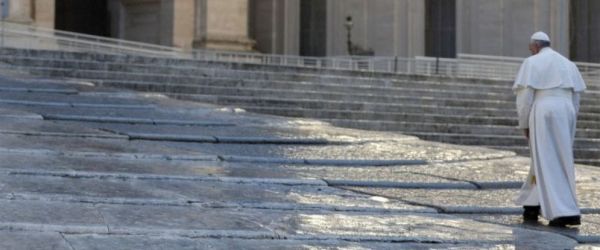Gospel reading continues the narrative of Jesus’ day in Capernaum, on a Saturday, the Jewish weekly holy day (cf. Mk 1:21-39). This time the Evangelist Mark highlights the relationship between Jesus’ thaumaturgical work and the awakening of faith in the people he meets. Indeed, with the healing signs that he performs on all types of sick people, the Lord wants to arouse faith as a response.
Jesus’ day in Capernaum begins with the healing of Peter’s mother-in-law and ends with the scene of a crowd of townspeople who gathered outside the house where he was staying, to bring all the sick people to him. Marked by physical suffering and by spiritual wretchedness, the crowd comprises, so to speak, “the living environment” in which Jesus’ mission, made up of healing and comforting words and actions, takes place. Jesus did not come to bring salvation in a laboratory; he does not preach from a laboratory, detached from people. He is in the midst of the crowd! In the midst of the people! Just think that most of Jesus’ public ministry took place on the streets, among the people; to preach the Gospel, to heal physical and spiritual wounds. This crowd of which the Gospel often speaks is a humanity marked by suffering. It is a humanity marked by suffering, toil and problems. It is to this poor humanity that Jesus’ powerful, liberating and renewing action is directed. That Saturday ends in this way, in the midst of the crowd until late in the evening. And what does Jesus do after that?
Before dawn the next day, he goes out of the town’s gates unseen and withdraws to a secluded place to pray. Jesus prays. In this way, he removes even himself and his mission from a “triumphalist” view which misunderstands the meaning of miracles and of his charismatic power. Miracles, in fact, are “signs” which encourage faith as a response; signs which are always accompanied by words that enlighten; and, taken together, the signs and words arouse faith and conversion through the divine power of Christ’s grace.
The conclusion of today’s passage (vv. 35-39) indicates that Jesus’ proclamation of the Kingdom of God finds its most rightful place on the streets. To the disciples who look for him in order to bring him back to the town — the disciples went to find him where he was praying and they wanted to bring him back to the town — what does Jesus answer? “Let us go on to the next towns, that I may preach there also” (v. 38). This was the journey of the Son of God and this will be the journey of his disciples. And it must be the journey of each Christian. The street, as the place for the Good News of the Gospel, places the mission of the Church under the sign of “going forth”, of journeying, under the sign of “movement”, and never of idleness.
May the Virgin Mary help us to be open to the voice of the Holy Spirit which propels the Church to increasingly “pitch her tent” among the people, in order to bring to everyone the healing word of Jesus, the physician of souls and bodies.
[Pope Francis, Angelus 4 February 2018].
Preach and Heal
Preaching and healing: this is the main activity of Jesus in his public life. By preaching He announces the Kingdom of God and by his healings He shows that it is near, that the Kingdom of God is in our midst. Having come to earth to announce and realise the salvation of the whole man and all men, Jesus shows a special predilection for those who are wounded in body and spirit: the poor, sinners, the possessed, the sick, the marginalised. He is the true Saviour: Jesus saves, Jesus heals. Christ's saving work does not end with his person and during his earthly life; it continues through the Church, the sacrament of God's love and tenderness for mankind. Caring for a sick person, welcoming him, serving him, is serving Christ: the sick person is the flesh of Christ. Therefore, each of us is called to bring the light of the Word of God and the strength of grace to those who suffer and to those who care for them. family members, doctors, nurses, so that the service to the sick is carried out more and more with humanity, with generous dedication, with evangelical love, with tenderness. (Angelus, 8 February 2015)
[https://www.vaticannews.va/it/vangelo-del-giorno-e-parola-del-giorno/2019/09/04.html]












